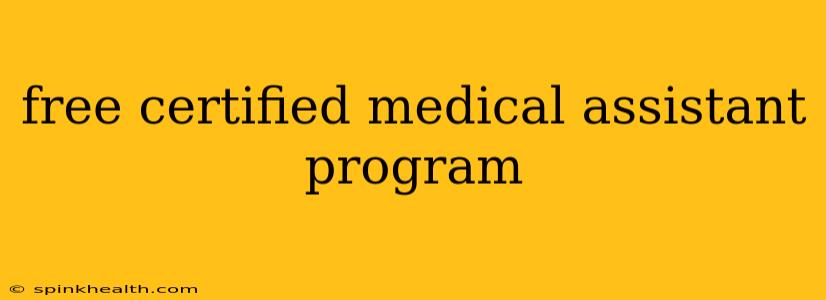The dream of a fulfilling career in healthcare is often met with the daunting reality of tuition costs. But what if I told you that achieving your certification as a Medical Assistant (MA) might not require breaking the bank? Let's explore the landscape of free or low-cost Certified Medical Assistant programs, unraveling the myths and realities surrounding this exciting opportunity.
My journey into the world of healthcare started with a similar question – how can I afford this dream? I spent countless hours researching, talking to professionals, and exploring different avenues. This article is born from that experience, aiming to guide you through the process and help you find the right path.
Are There Truly Free Certified Medical Assistant Programs?
The short answer is: it's complicated. While completely free, fully accredited programs are rare, many options exist that significantly reduce the financial burden. These often come in the form of:
-
Government Grants and Subsidies: Many state and federal programs offer grants or subsidies to individuals pursuing healthcare careers. These grants don't need to be repaid and can substantially lower the cost of your education. Researching your eligibility based on your income and other factors is crucial.
-
Scholarships: Numerous organizations offer scholarships specifically for aspiring medical assistants. These scholarships can be based on merit, financial need, or affiliation with certain communities. Diligent searching and application are key to securing this funding.
-
Hospital and Clinic Sponsorship Programs: Many healthcare facilities recognize the value of investing in their future workforce. They often partner with educational institutions to offer tuition assistance or even fully-funded programs to promising candidates in exchange for a commitment to work at their facility after graduation.
-
Community College Programs and Vocational Schools with Financial Aid: While not necessarily "free," community colleges and vocational schools often offer more affordable tuition than traditional four-year universities. Moreover, they frequently have robust financial aid programs, including grants, loans, and work-study opportunities, that can make the program significantly more manageable.
What About Online Programs? Are They Free?
Online programs offer flexibility and convenience, but free, fully accredited online MA programs are even rarer than in-person options. Be wary of programs that seem too good to be true – ensure they're accredited by a reputable organization like the Commission on Accreditation of Allied Health Education Programs (CAAHEP) or the Accrediting Bureau of Health Education Schools (ABHES). Accreditation verifies the program's quality and ensures your certification will be recognized by employers.
How Can I Find Free or Low-Cost Programs in My Area?
Your search should begin with these resources:
-
Your State's Department of Labor or Workforce Development: These agencies often have databases of healthcare training programs and financial aid opportunities.
-
Local Community Colleges and Vocational Schools: Contact their admissions offices and inquire about financial aid, scholarships, and potential partnerships with healthcare providers.
-
Healthcare Professional Associations: Organizations like the American Association of Medical Assistants (AAMA) often have resources and links to scholarships and financial aid opportunities.
-
Online Scholarship Search Engines: Websites like Fastweb, Scholarships.com, and Sallie Mae provide comprehensive databases of scholarships for various fields, including healthcare.
What are the Requirements for Free or Low-Cost Medical Assistant Programs?
Requirements vary widely depending on the program and funding source. However, you can generally expect to meet some or all of these:
- High school diploma or GED: This is a fundamental requirement for most MA programs.
- Background check and drug screening: Healthcare facilities require a clean background check.
- Certain GPA requirements: Some programs may have minimum GPA requirements.
- Commitment to work after graduation (for sponsored programs): Sponsored programs often require a work commitment in return for tuition assistance.
How Long Does a Medical Assistant Program Take to Complete?
Most programs range from several months to a year or more to complete. The duration can vary depending on whether you choose a full-time or part-time program and the program's curriculum.
Embarking on a career as a Medical Assistant is a rewarding journey. While the path may seem challenging initially, remember that numerous resources are available to help you achieve your dreams without incurring insurmountable debt. Thorough research, dedication, and perseverance are your best allies in finding the perfect, affordable, and fulfilling program. The healthcare industry eagerly awaits your contribution!

